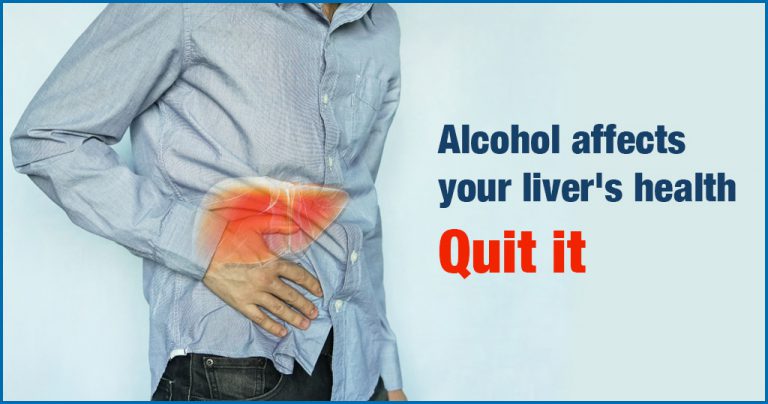
The liver is the largest organ in our body which plays a central role in metabolic processes. Alcohol can damage the liver and its functioning. Over the years, the number of alcohol-related diseases and death is increasing. Young people between the age group of 25 – 34 are more affected at a prime period of life.
How is alcohol related to liver?
The liver is a most important organ which performs around 500 functions daily like bile production, detoxifying substances, metabolizing proteins, storage of vitamin and minerals and so on. The liver acts as a filter and processes whatever we eat or drink, including alcohol.
Drinking of alcohol puts our liver under stress which further causes dehydration, scarring and alcohol-related liver diseases; even when people don’t have a family history of such diseases.
Also Read : Liver Function Test Normal Range
What is Alcohol-Related Liver disease and what are the different stages?
A damage caused to the liver or its function due to alcohol abuse is known as Alcohol-Related Liver disease. Nowadays, more people are getting affected due to alcohol abuse, especially young adults. Research has proven that there is a rise in morbidity and mortality due to alcohol-related liver diseases, especially with binge drinking.
Alcohol-related liver diseases can occur in the following stages, however, there can be an overlap between each stage:
- Alcoholic fatty liver: It is the first stage of liver disease which usually occurs due to heavy drinking or even to those drinking large quantity in one day. Deposit of fat causes liver enlargement, which further affects the functioning of the liver. Alcoholic fatty liver disease is reversible by stopping alcohol.
- Alcoholic hepatitis: Continuous alcohol consumption for a long period of time can result in liver inflammation leading to a degeneration of liver cells. It is a critical condition, as it can cause serious damage to the liver and can be life-threatening. Alcoholic hepatitis disease can be reversible if the use of alcohol is stopped and diagnosed before it becomes severe. One has to take proper treatment to recover.
- Cirrhosis: This is the last stage of alcohol-related liver disease whereby the damage happened to the liver cannot be reversed but, if it is diagnosed in the early stage it can be treated. However, the damage done cannot be reversed. Cirrhosis is permanent scarring (fibrosis) of the liver tissues. Patient with cirrhosis is more prone to liver failure.
People generally think that all bodies react in the same way to alcohol. However, it is not true. Specific factors that affect the reactions to alcohol are – gender, body weight, metabolism, other psychological factors, nature of work etc. If you drink alcohol and notice any of the following symptoms, you need to visit your doctor:
- Skin and eyes appear yellow
- Pain and swelling in the abdomen
- Decease in appetite
- Nausea or vomiting
- Chronic fatigue
- Diarrhea
People often ignore the early or first signs of liver damage and continue to drink alcohol. In some cases, symptoms related to the liver damage or disease are not visible unless it is too late and cause irreparable damage to the liver.
During your visit to the doctor, apart from the clinical examination, you will be asked questions about your current and past alcohol consumption. To be honest, while answering the questions as this is important. In some cases, a doctor might talk to your family members regarding your drinking habits. You might be recommended to undergo tests like – blood test, liver function test, MRI and liver biopsy (if required). Treatment for alcohol-related liver diseases includes:
- Abstinence from Alcohol: Alcohol consumption has to be stopped and therapies are recommended to cope with withdrawal symptoms like – counseling, alcoholic rehabilitation program, etc.
- Nutritional Therapy: Special diet is recommended to correct malnutrition and to increase the intake of mineral and vitamin levels.
- Medication: After careful screening and based on the staging of disease, medication will be recommended.
- Liver Transplantation: High-risk patients who have not responded to any treatment are often recommended for liver transplantation to prevent death.
Is Liver transplant a good option for alcohol-related liver diseases?
Liver transplant surgery is a life-saving treatment for patients with end-stage liver disease. The prime factor to be an eligible recipient for liver transplant would be abstinence from alcohol.
Prevention is better than cure. The best way to prevent alcoholic liver disease is early diagnosis and treatment. Some changes in lifestyle is always a good choice:
- Eliminating alcohol from your life
- Maintaining a healthy diet & fitness regime
- Spending quality time with your family and friends
- Obtaining counselling or participating in rehabilitation programs
- Avoiding smoking
- Seeking medical attention on the onset of initial symptoms
- Undergoing Regular health check-ups
Conclusion
Alcohol can shorten your life span. People often consider that moderate alcohol use is beneficial to their health. But, there are no specific guidelines stating how much quantity is considered as moderate. However, even moderate consumption of alcohol is definitely not risk-free. Patient with alcohol-related liver disease should strictly abstain from alcohol. Liver transplant is considered life-saving surgery, but patients who are addicted to alcohol are not considered for a transplant. Hence, rethink before you drink.















